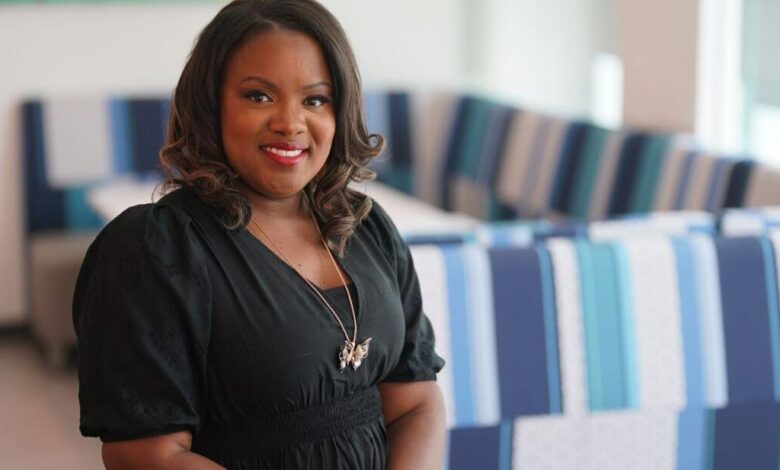UB’s Cultivator program major part of startup support system

Hennesys Disla didn’t just participate in the University at Buffalo’s Cultivator program for startup companies, it became the catalyst for her moving from Brooklyn to Buffalo in April.
She saw coming to Western New York as an opportunity to scale her business, ArmHug, an e-commerce company that supplies portable medical kits to nurses and phlebotomists.
So far, she’s had no regrets.
Not only did Cultivator provide Disla the resources she needed to grow her business, but she’s also made helpful local connections that have provided referrals to potential investors and experts in the industry.
Disla moved her team and company’s manufacturing to Buffalo – the Cultivator requires participant companies to reside in Western New York – and now many of ArmHug’s customers are also from the area.
People are also reading…
Moving her startup to Buffalo for Cultivator has been reminiscent of what companies have done for nine years after winning the 43North competition.
Cultivator, which provides mentorship and funding for promising local businesses, has become a significant link to the chain of support for startups. And it is part of UB’s expanding efforts to become a linchpin for Buffalo’s startup ecosystem.
“It’s been really fruitful to see how the business has grown and moving to Buffalo has helped a lot,” said Disla, who discovered Cultivator through LinkedIn and then started to make local connections in November by attending Startup Week in Buffalo. “I didn’t think I would have made a move to Buffalo, of all places, but I didn’t know that the resources were there.”
ArmHug is one of three companies to graduate in September from Cultivator, a program housed in UB’s downtown incubator at the Center of Excellence in Bioinformatics and Life Sciences. To date, 50 startups have participated in Cultivator and 16 have graduated.
Tonawanda native Kevin MacVittie may not have moved back to Buffalo specifically for Cultivator, but it was something he prioritized shortly after returning to the area last year and spinning his company out into V-Markings, which provides data to build, augment and maintain high-definition maps. He began by working with airports before pivoting to clients doing road and highway work.
MacVittie was once responsible for innovation programs at Clarkson University, so he got in touch with a colleague doing similar work at UB, who pointed him toward Cultivator. The timing couldn’t have been better.
“It was an exceptional process,” MacVittie said. “The people and the support are incredible. I really like the approach of trying to work with you by meeting you where you are and for us, they focused right at the start.”
Managed by UB’s Business and Entrepreneur Partnerships team, Cultivator provides startups with mentors and sets them up with partners in the local startup ecosystem, such as Launch NY, 43North, the Buffalo Angels and the Western New York Impact Investment Fund.
“We pair founders with experienced entrepreneurs who have walked in their shoes and can help them answer critical questions about the problem their business solves and the market it serves,” said Peter Burakowski, a former 43North executive who now leads the Cultivator as associate director of startup ventures at UB.
Medina native Mercedes Wilson was referred to the program by a few people who thought her business, Sadie’s Relish, could flourish with the help of Cultivator.
Funding for startups in their early stages is critical, yet traditionally difficult to obtain, especially for people from underserved communities. Startups participating in Cultivator receive a $100,000 investment from UB. It helps them meet key early milestones, gain proven traction and create a larger pipeline.
Wilson put the money she received in February toward increasing production capacity of the product, helping Sadie’s Relish get into more stores.
Her relish, a family recipe passed down by her father, Kelvin Holloway, was initially sold only at Niagara Produce but now is in close to 130 retailers, including Tops, Wegmans, Lexington Co-op and Market32.
“I’m a foodie and I’ve done food on television, but getting in the food business is a totally different world,” Wilson said. “Every day, I’m thankful for this program. It opens doors. In any business, once people see you building momentum, then they naturally want to help. It draws in community and people who want to offer their expertise.”
The program also aims to help prepare companies for future investment from other funding sources.
“For startups in their earliest, riskiest stages, funding often comes from wealthy friends and family, but not all founders have these relationships,” said Richard Kim, director of startup ventures at UB. “We believe there are talented entrepreneurs in every corner of Western New York. Cultivator democratizes access to funding and provides more founders with opportunities to successfully build and scale business.”
In the first phase of the program, founders have weekly meetings with experienced entrepreneurs who provide practical solutions, feedback and guidance in what to focus on. Phase two gets more into road mapping the companies’ growth plans.
“When you’re starting a new company, there are thousands of things you could be doing, and they do a great job of helping you focus on the one or two things you should be doing,” MacVittie said.
Mentorship may be the most important part of the program for founders, but meeting biweekly among the fellow entrepreneurs in the program also helps as they discuss successes and failures.
“The main thing is that you realize that you’re not alone,” Wilson said.
Guidance is provided to company founders on how to tell the story of their business and ask for money – something that does not come easy for everyone, Wilson said. She also now feels more well versed about what she’s doing in the food space.
Company founders also are encouraged to think bigger, Disla said. She has clients locally, as well as throughout the U.S., but she’ll soon start focusing on global growth after raising another round of funding. Her sales have quadrupled over the past few months.
“They’re very future focused,” Disla said. “You’re building long-lasting relationships, which is great.”
Among the Cultivator’s graduate companies is Arbol, a financial wellness platform that helps colleges and universities reduce student dropout rates. Arbol announced in June that it closed a $350,000 pre-seed funding round led by the Western New York Impact Investment Fund.
“Cultivator was a game-changer for us. We came into the program with an idea and, a few months later, launched the company with funding,” said Favio Osorio, co-founder of Arbol.
Companies that have completed the program continue to talk among one another and know they can always reach out to their program mentors. In fact, MacVittie recently reached out for advice as he goes through a pre-seed funding round.
“Especially having just moved back to the area, the opportunity to meet other people in the same space has been fantastic,” he said. “We made it through this program and got the support we needed while doing it.”




